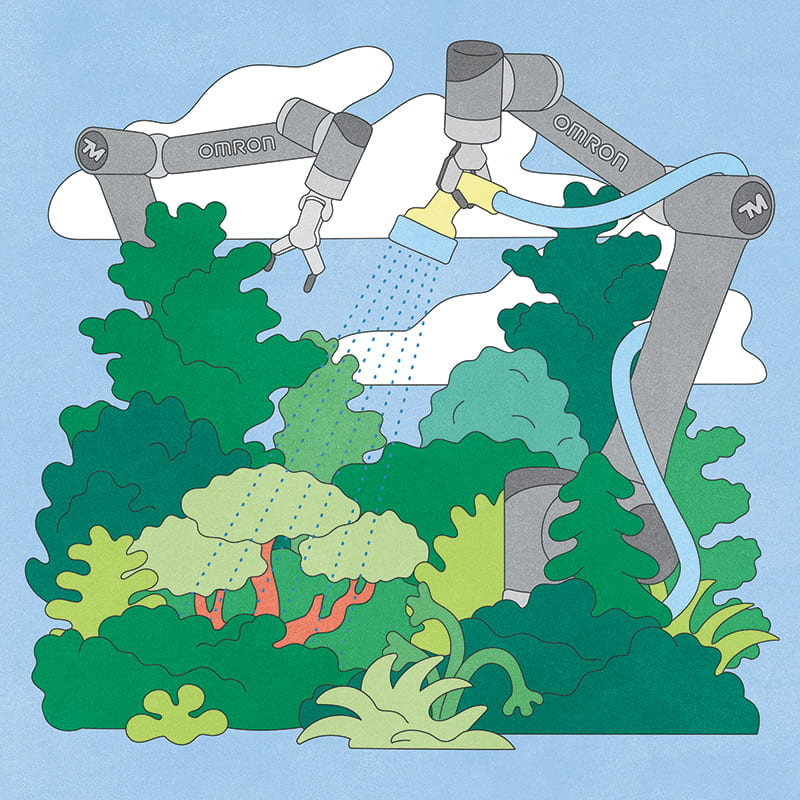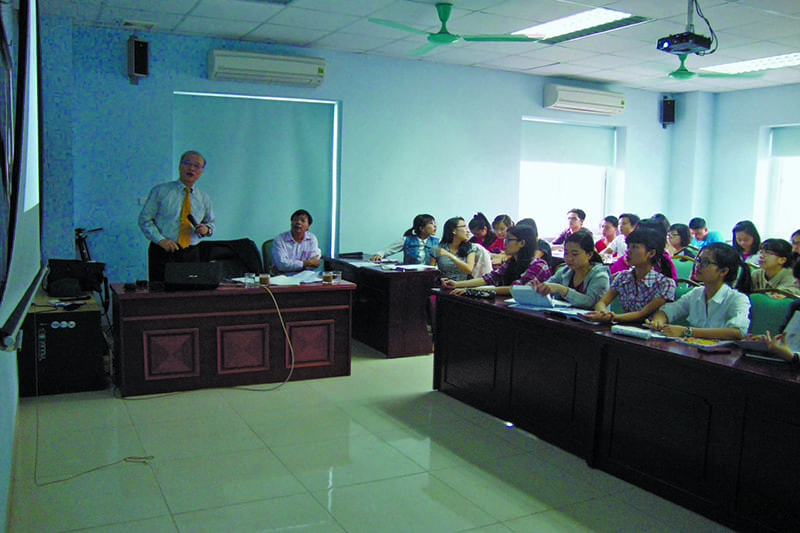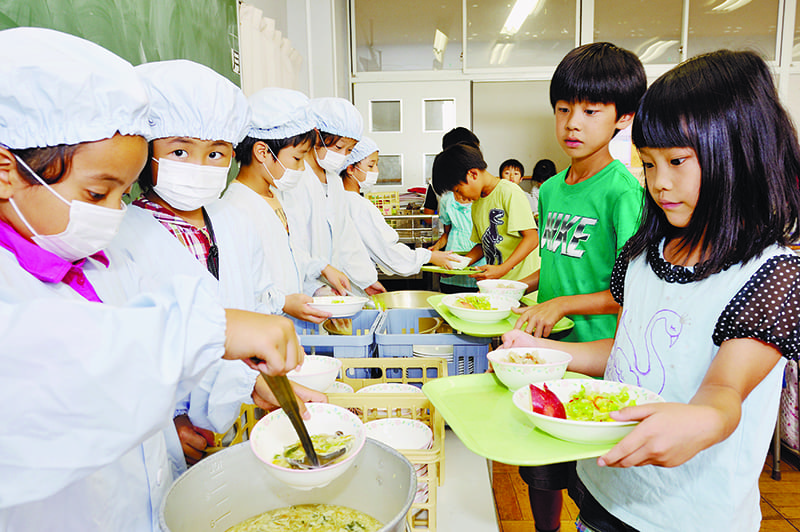November 24, 2023
Ajinomoto helps people, planet with amino acids
VOL. 10: Ajinomoto Co. Inc.
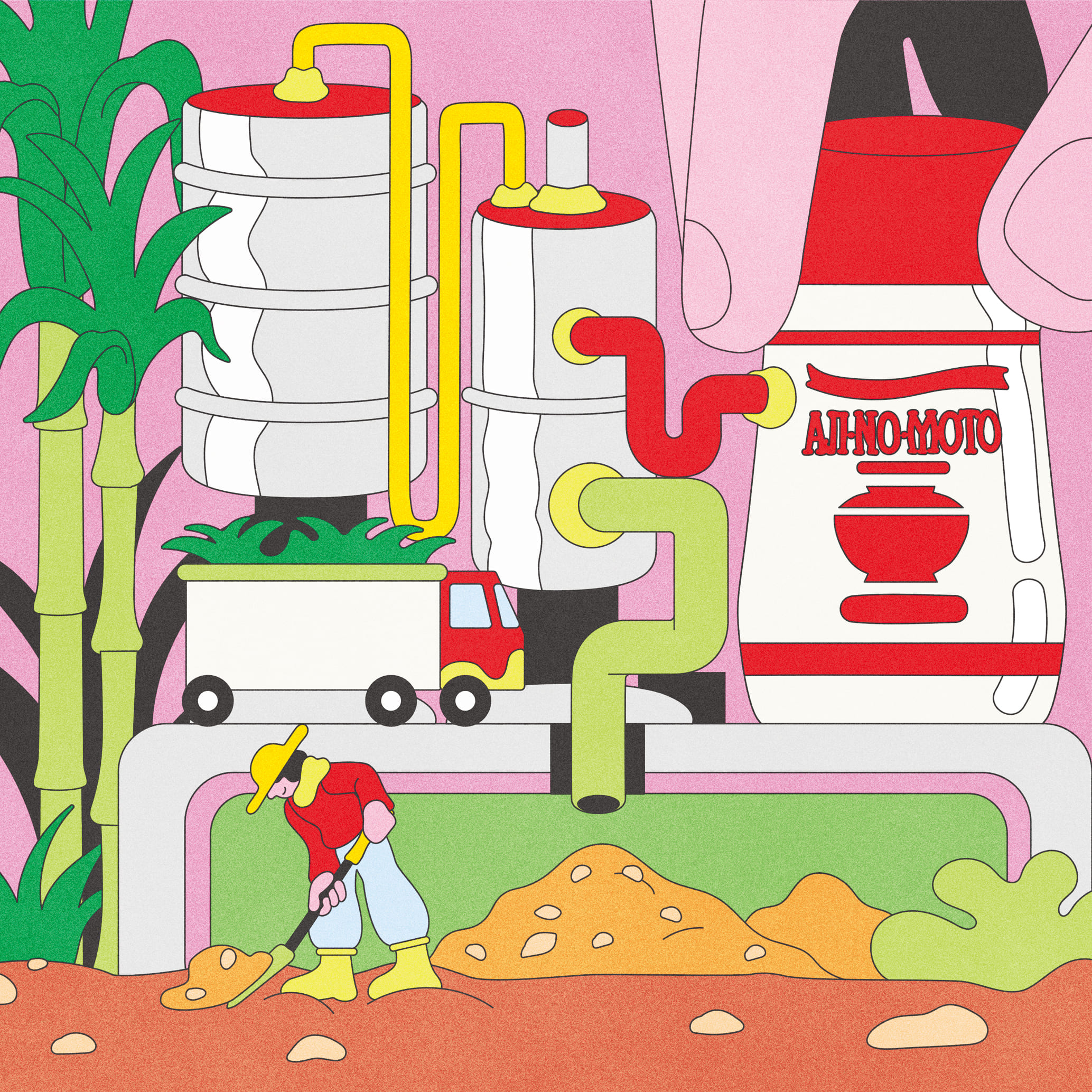
Ajinomoto’s strong points
1.Rated the highest among Japanese food and agricultural companies by the World Benchmarking Alliance, which evaluates achievements toward the U.N.’s sustainable development goals
2.Basic management policy is an initiative called ASV to co-create social and economic value through business
3.Group’s purpose: “Contributing to the well-being of all human beings, our society and our planet with ‘AminoScience’”
4.Has pledged to improve the healthy life expectancy of 1 billion people and reduce its environmental impact 50% by 2030
The World Benchmarking Alliance is an agency established by the United Nations Foundation, a Dutch nongovernmental group and other organizations to assess key companies’ degrees of achievement toward the U.N.’s sustainable development goals. This October, it announced the rankings of 350 major companies involved in food and agriculture.
The WBA had previously assessed such companies in 2021. In its introduction to the new results it said, “The data shows that the vast majority of companies fail to recognise their responsibility to protect the planet and feed the world in an equitable way.”
Notably, though, one Japanese food company’s ranking rose significantly: Ajinomoto Co., Inc. which jumped from 90th place to 16th, the highest among Japanese companies. The top-ranked company was Unilever, followed by Nestle and Danone.
In 2021, Ajinomoto established a sustainability advisory council, which includes outside experts, subordinate to its board of directors. At the same time, it set up a sustainability committee, an internal body tasked to powerfully drive strategies based on the council’s recommendations. It was these reforms, placing sustainability at the center of management policy, that are believed to have led the WBA to rate Ajinomoto highly.
Still, the high rating is not unrelated to the company’s core business as well. The truly unique aspect of Ajinomoto is that its core business is directly linked to improvement in the sustainability of humanity and the global environment.
A century of shared value
Ajinomoto began business in 1909 with its namesake seasoning — the world’s first umami seasoning using monosodium glutamate (MSG). Since then, the company has worked to improve people’s nutrition and enrich their diets with the help of umami — the fifth basic taste — and amino acids, chemical building blocks.
To take advantage of the potential of amino acids in areas beyond nutrition, Ajinomoto has expanded into such areas as health care. For example, in 2005 it launched Glyna, a functional food that improves the quality of sleep.
The underlying principle of the company is encapsulated in the term “ASV,” meaning Ajinomoto shared value, which it defined in 2014 based on its founding spirit (see the interview in the box).
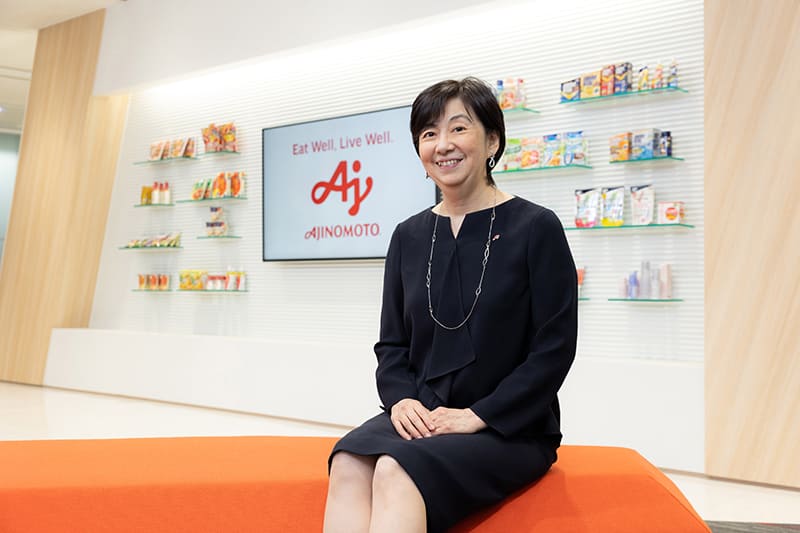
‘ASV’ term reflects sustainability-driven management
Chika Morishima
executive officer and vice president in charge of sustainability and communications
If I am asked what Ajinomoto’s management policy is, my answer is that we are an ASV-driven company. “ASV” is a term coined by the Ajinomoto group, standing for “Ajinomoto group creating shared value.” Simply put, it is an Ajinomoto version of CSV (creating shared value). It tells us to maintain efforts to solve social issues and create economic value through our business.
It originates in our founding spirit, summarized in the slogan “Eat well, live well.”
Umami has been increasingly known around the world as the fifth basic taste. The substance that causes the taste was discovered by Kikunae Ikeda, a chemist who successfully extracted glutamic acid, a pure form of the umami substance, from a seaweed stock in 1908. The launch of “Ajinomoto”, an umami seasoning created by processing this glutamic acid, in the next year, 1909, was the beginning of the Ajinomoto group.
The product was born out of the desire to help Japanese eat a lot of delicious, nutritious foods, improve their nutritional condition and to see them become healthier. So our starting point itself was a desire to solve a social issue.
It now has been more than 100 years since then. The Ajinomoto group has grown by handling a wide range of foods, from diverse seasonings to frozen foods, but its basic stance of contributing to solving social issues has not changed.
The founding wish has been handed down and eventually led to the slogan “Eat well, live well.” In 2014, then-President Masatoshi Ito established the concept of ASV, wishing for Ajinomoto to grow by solving social issues and improving economic value.
That is why we believe that ASV-driven management is nearly synonymous with practicing sustainability-driven management.
In fiscal 2016, we ended a commendation program recognizing employee achievements, and in its place introduced the ASV Awards program. The program’s evaluations attach importance not just to economic benefits but also to what social issues were solved through what processes. ASV-driven management has significantly taken root all across the company.
In February 2023, we updated our purpose to “Contributing to the well-being of all human beings, our society and our planet with ‘AminoScience,’” with the aim of bolstering this ASV-driven management.
The food industry is increasingly required to both provide nutrients good for health and not affect the environment. For starters, we won’t be able to continue operating our food business forever without a sustainable natural environment.
The global population will reach 10 billion by 2050. Unless we work to solve issues by that point, we will have huge problems. We seriously wish to support the well-being of 10 billion people in ways unique to Ajinomoto, using the AminoScience that we developed through research on amino acids.
Since then, Ajinomoto has accelerated its sustainability strategies based on ASV initiatives in which it put the “co-creation of social and economic value” into practice. In 2020, it set two key targets for 2030 — “extending the healthy life expectancy of 1 billion people” and “reducing our environmental impact by 50%” — and in February 2023, about 10 months into the tenure of President Taro Fujie, updated the group’s official purpose to “Contributing to the well-being of all human beings, our society and our planet with ‘AminoScience.’”
Ajinomoto stylizes as “AminoScience” a scientific approach that links materials, functions and technologies gained through research and development on amino acids with solutions for social issues and well-being. Its purpose says it contributes to the sustainability of people and the planet through a scientific approach based on amino acids.
So, how does Ajinomoto plan to achieve the two targets of extending healthy life expectancies and reducing its environmental impact?
Healthy life expectancy
Low salt intake and sufficient protein are key to extending healthy life expectancy. In addition to offering products that directly lead to a reduction in foods’ salt content, such as umami seasoning, Ajinomoto has been working on activities to promote salt-reducing initiatives using umami in 12 municipalities in Japan and 10 other countries.
Certain amino acids combine to form proteins, which are essential for health. Protein intake can be regarded as one of Ajinomoto’s strengths. It has been working to develop products that promote the natural intake of protein. It estimates that in fiscal 2022, it provided products that contributed to nutritional improvement for 880 million people.
The third pillar for life expectancy is improvement in nutritional balance, according to Chika Morishima, Ajinomoto’s executive officer and vice president in charge of sustainability and communications.
“A nutritionally balanced diet is an essential factor for extending healthy life expectancy,” Morishima said. “Japan has success stories of nutritional improvement using the dietitian system and school meals. I strongly believe the know-how [of Ajinomoto] of thinking about nutrition in menu units can contribute to any place around the world, as a company founded in Japan.”
Her belief is exemplified by a nutritional improvement project in Vietnam.
In 2012, Ajinomoto launched a collaborative project with an administrative body in Vietnam in which Japan’s school meal system is applied. In order to improve school meal operations and food safety management, the project first set up a model kitchen in an elementary school in Ho Chi Minh City. Ajinomoto provided menu books as well as education materials on food and nutrition, and gave education insiders from across Vietnam tours of this initiative.
Furthermore, it developed a software program that enables even cooking staff who have little knowledge about nutrition to provide nutritionally balanced foods to children, and also made it available on a website. This school meal project covered 4,262 elementary schools in 62 municipalities in Vietnam as of last March.
Ajinomoto has also supported activities to produce dietitians in Vietnam. In 2011, it jointly launched the Vietnam Nutrition-System Establishment Project, which aims to train nutritionists, together with Vietnam’s National Institute of Nutrition. The first achievement under the project was the 2013 opening of a course on nutrition at the Hanoi Medical University. In 2017, 43 individuals became the first dietitians in Vietnam.
Since then, the number has kept increasing. Dietitians now work in various places in Vietnam, contributing to the improvement of school meals’ nutrition. Ajinomoto plans to expand the project to other countries in the Association of Southeast Asian Nations.
Ajinomoto’s work to contribute to nutrition and healthy life expectancy for people overall is linked to “reducing its environmental impact,” another of its goals, in a significant way.

COURTESY: AJINOMOTO
Resource recycling
Ajinomoto handles food, a blessing of nature. And seasoning, the company’s mainstay, is born from nature.
To manufacture its umami seasoning, whose main ingredient is MSG, Ajinomoto uses a fermentation method in which microbes extract glutamic acid from saccharides derived from sugar cane, corn, cassava and other ingredients. It then combines the glutamic acid with sodium to create the final product.
The Ajinomoto group’s business is thus founded on a plentiful global environment. That is why it regards reducing global impacts on the environment and helping it recover to be as important as contributing to nutrition and health.
Ajinomoto has always been aware of its impact on the environment, according to Morishima, because it uses large amounts of grains.
More than four decades ago, this awareness led Ajinomoto to start recycling nearly 100% of a byproduct of umami production — Ajinomoto calls it a “co-product” — into fertilizer and animal feed. In addition to recycling large amounts of co-product without generating waste, this has led to effects such as a reduction in the amount of conventional chemical fertilizers that would otherwise have been manufactured, a process that generates carbon dioxide and other greenhouse gases. Another effect is support for sustainable farming.
Ajinomoto’s wide-ranging efforts to reduce environmental impacts also include reducing the amount of greenhouse gases discharged from production processes and reducing the amount of plastic used in packaging. It has pledged to reduce Scope 1 and 2 direct and indirect emissions of greenhouse gases 50% by 2030 compared with the 2018 level and achieve net-zero emissions, including Scope 3 supply-chain emissions — that is, become carbon neutral — by 2050.
Morishima said: “We’re going to maintain efforts to reduce negative factors that have impacts on the environment. But we aim to make positive contributions so that we will go beyond just achieving net-zero emissions and have positive impacts.”
She added, “To do that, we need to reform the food system.”
Reforming the value chain
What Morishima calls the food system refers to the entire value chain — farming, processing, distributing and consuming. At many points along it, large amounts of carbon dioxide and other wastes are discharged, and problems such as illegal farmland expansion or human rights abuses have occurred.
How does Ajinomoto aim to become involved in reforms? The company believes AminoScience will be very useful in this regard.
The co-product from umami production, besides being recycled into fertilizer, can also be used in the production of crops including coffee and fruits. In fact, Ajinomoto has been using the co-product to reduce carbon emissions or improve productivity in supply chains that are unrelated to it.
Furthermore, an Ajinomoto group company in Spain, Agro2Agri S.L., sells biostimulant products in more than 50 countries.
Biostimulants are substances that support the sound growth of plants. They reduce the effects of stresses such as high or low temperatures and drought. They are attracting attention as an essential factor for sustainable farming, as they can improve yields and quality, reduce the needs for water and fertilizers, and improve farmers’ incomes.
Their source materials are based on amino acids. Ajinomoto believes the expansion of the biostimulant business will contribute to reforms in the upstream of the food system.
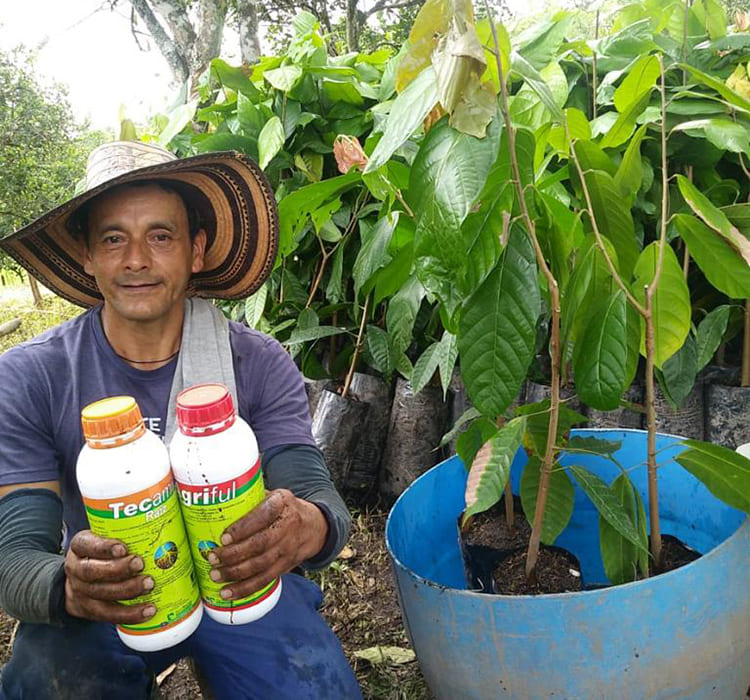
COURTESY: AJINOMOTO
Supporting farmers
Ajinomoto’s AminoScience is beginning to have positive impacts on the supply chain of the dairy industry.
Methane that cows burp and nitrous oxide that is generated when treating cattle waste are estimated to represent about 30% of the greenhouse gases discharged from Japan’s agriculture, forestry and fishing industries. The concentration of nitrous oxide in the atmosphere is lower than those of other greenhouse gases, including carbon dioxide and methane, but its per-molecule contribution to global warming is said to be about 300 times higher than carbon dioxide.
Recent research found that nitrous oxide from agricultural production represents 82% of the global total of the emissions of this gas. This means reforming the food system is an urgent issue.
In 2011, Ajinomoto developed a product that helps solve this issue: AjiPro-L, a lysine formulation that is effective for reducing nitrous oxide in dairy cows’ excrement and urine. Lysine is one type of amino acid; humans, among other animals, must eat food containing it in order to make proteins.
Feed for dairy cows that has AjiPro-L mixed in to improve its amino acid balance reduces the amount of nitrous oxide emissions from their excrement and urine by about 25%. At the same time, such feed allows lysine, a nutrient whose intake is often insufficient in cows, to reach the small intestine efficiently to help digestion, thereby improving the animals’ health. It also reduces costs for farmers by allowing them to use smaller amounts of expensive feed items, including soybean cake.
Ajinomoto says it has the largest share of the global market of lysine formulations for dairy cows. In order to promote the product, the company developed a program in which dairy farmers can increase revenues by using AjiPro-L to reduce greenhouse gas emissions. The program, first introduced at dairy farms in Nemuro, Hokkaido, has been in operation since last March.
The program is operated in collaboration with Meiji, a major food company in Japan, and uses the J-Credit Scheme — in which the government certifies amounts of reduced emissions of greenhouse gases or their absorption — to obtain credits for the greenhouse gas reductions achieved through using AjiPro-L. Meiji buys these credits and uses them as carbon offset credits for itself, and the money goes to farmers who achieve reduced emissions.
Costs have been a major issue for farmers trying to reduce greenhouse gas emissions from dairy cows. The new program has the potential to lead to a significant breakthrough.
What Ajinomoto sees farther ahead is a restructuring of the food system. How are we going to feed the global population of 10 billion people expected by 2050? Can we do that and still reduce our environmental impacts? No one has the answers to these questions.
But Ajinomoto is struggling to find answers — using the power of amino acids.
アミノ酸で人類の健康寿命と環境に貢献する。
〈味の素〉の祖業は、100年以上前の1909年に発売した「味の素」。アミノ酸の一つである「グルタミン酸ナトリウム(MSG)」を使ったうま味(Umami)調味料を、世界で初めて世に出した。
以来、同社はアミノ酸のうま味やチカラで食品業界をリード。ASEAN各国や欧米を中心に世界36の国・地域に展開し、人々の栄養を改善したり、食生活を豊かにしたりすることに苦心してきた。
根底にあるのが、創業以来の志をもとに2014年、再定義した「ASV」である。ASVはアミノ酸を軸とした各種事業を通じて「社会価値と経済価値を共創」する取り組みの総称。「サステナビリティ経営」という言葉がない時代からASV経営を基本方針とし、実践してきた。
そして〈味の素〉はこのASV経営に基づき、サステナビリティ戦略をより加速。2020年、アウトカムとして2030年までに「10億人の健康寿命を延伸する」「環境負荷を50%削減する」ことを2大目標として掲げた。この目標を、味の素はどう達成していくつもりなのだろうか。
Return to Sustainable Japan Magazine Vol. 30 article list page


